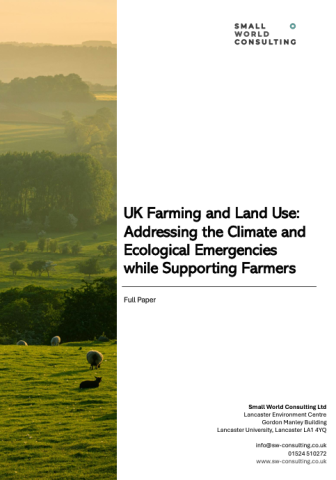This report provides 15 answers to questions around sustainable farming and land use:
-
When deciding how to optimise the use of each piece of land, we need to consider the impacts on climate, nature, food production and livelihoods – locally, across the UK and globally.
-
There is a role for livestock in regenerative farming, although in lower numbers than current stocking levels.
-
Regenerative farming does improve biodiversity, soil health and carbon storage. Reducing livestock numbers would allow more land for crop production and some land to be restored as woodlands, peatlands and wetlands, which would be even more effective for biodiversity and carbon storage.
-
New technologies relating to livestock, including methane-reducing breeds and diets, should be pursued but not relied upon as a sole solution. We need to deploy all the available options to reduce emissions.
-
While there is a role for regenerative livestock farming, the need to reduce meat and dairy consumption is also clear-cut; this will both reduce agricultural emissions and free up land for other uses, both in the UK and worldwide, by reducing the imported feed crops fed to UK livestock.
-
A more plant-based food system would allow the UK to reduce imports and increase food security. New technologies for producing plant-based foods indoors, including vertical farms, may also allow non-rural areas to contribute to UK food production.
-
Farmers’ current practices and cultural identities are already being threatened by the effects of climate change as floods, heatwaves and droughts alter our landscapes.
-
Farmers will need support across policy and society so that they can lead the rest of society to a sustainable food and farming system, and safeguard their communities and livelihoods against the impacts of climate change.
-
Farmers need to be central participants in the debate on sustainable farming, and a clear scientific evidence base will aid them as well as all other parties involved.
Download the Executive Summary and Full Report Below.


